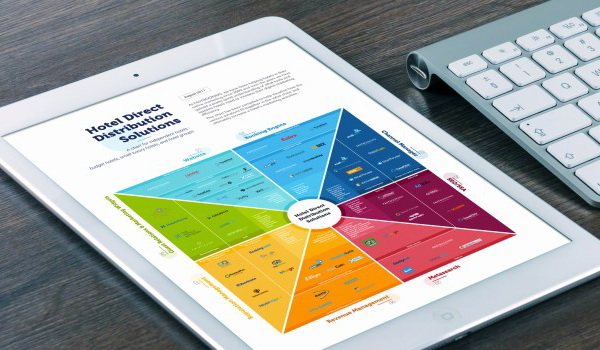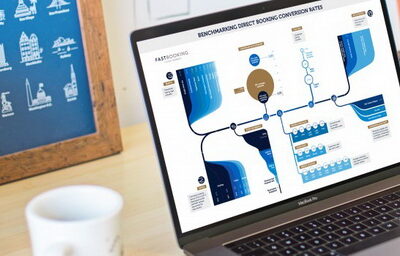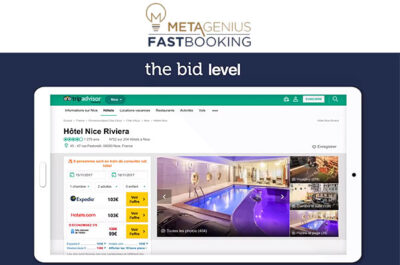A guide for independent hotels: budget hotels, small luxury hotels, and hotel groups
As a Hotel Manager/Director, have you ever felt uncertain or slightly overwhelmed by the number of partners and tools you need to manage to properly market your hotel?
It’s a fact that in today’s hotel marketing world, managing online distribution performance, hoteliers need to activate various triggers and a very wide range of skills: The good news is that technology is a great facilitator, enabling more control and measurement, giving more access to a greater number of potential guests. Something that only a few could afford just a few years or months ago.
The less good news is that hoteliers are now at the very heart of a complex ecosystem, with a multitude of solutions and players, and it is not so easy to get the full picture of the most important solutions on the market. And it is even more difficult to work out which solutions are the most appropriate to fit one’s needs.
At FASTBOOKING, we have been helping hotels in their online marketing since 2000 and over the years we have gained a pretty good understanding of what tools and systems hotels need to increase their digital marketing efficiency.
We have compiled this guide and a related infographic to help hoteliers understand the ecosystem of partners, systems, software and advertising tools every property deals with on a daily basis.
The objective is to provide you with an overview of the main systems and tools a hotelier can use at the different levels of the online distribution value chain to boost his sales, especially his direct sales.
Hotel Marketing Value Chain

Additionally we have divided it into sections to help you evaluate the partners that are best suited to your needs depending on the size of your hotel and brand.
The main categories are Individual Hotels and Hotel Groups.
Of course this division is not written in stone and often a small budget hotel can choose the same PMS or web agency used by a big chain, but it’s important to invest wisely, otherwise there’s a real risk of getting disappointed by results.
Methodology
We have categorized the systems and providers based on our knowledge of the market and our experience working with various hotels of various sized. We have attempted to include the main Global players and when relevant, the leading Regional players with an established experience but of course the list is not exhaustive.
We have divided the hotel types in two main categories: Individual Hotels and Hotel Groups, as these two categories have distinctly different needs and requirements when it comes to marketing technology.
Website design: from visitors to guests
The first step in any hotel marketing strategy, still to this day, is to get a proper hotel website. That may sound redundant but it’s not uncommon to overlook this aspect. What hotels should keep in mind is that the purpose of a hotel website is to generate direct sales, and thus primarily to convert visitors into guests. While there may be other goals that can be achieved with a hotel website such as promoting a restaurant, meeting rooms or other ancillary services, they must be implemented considering that the website’s main objective is to convert visitors into guests.
As this is one of the (probably) most expensive marketing tool hotels invest in, they have to make sure to have realistic goals in mind when choosing a website design agency. A fully customized website is probably the obvious choice for a big property, a small chain or a luxury hotel, but not necessarily for smaller properties or budget hotels. It is important to keep in mind that any website needs to be adapted (if not created from scratch) to new trends and technology every 24 to 36 months, so smaller hotels, hostels or B&Bs with low ADR can consider buying a pre-designed template or choose an online website builder. It’s important to remember that hotel staff will have to update contents (special offers, news, packages) and media (photos, brochures, pdfs) on a regular basis and they need to do it freely, easily and without the need of extra development, as the latter is a typical hidden cost in website creation.
Larger hotels and hotel chains will also have to consider the capacity of the chosen website design agency to value their added services and increase their ancillary revenue (Food and Beverage, SPA, events activity, etc.). New and effective tools and technologies like 3D meeting planner to better value MICE or real-time restaurant table management systems are now available, often for a very good value for money.
What to look for in a Website Design Agency:
- Easy to use Content Management System to update offers, photos etc.
- Open Source CMS if there’s the need to move the website to another server
- Source code optimized for SEO*
- Conversion driven design
- Emotional impact.
- Encompass the whole hotel business hotel (MICE, F&B, Wellness, etc.)
- Dedicated mobile design and SEO strategy*
- Video, 3D plans and 3rd party software API integrations
- Creation of geo-targeted dynamic landing pages
*refer to SEO section for more info
Booking Engine: at the end of the funnel
Booking Engines are a pretty much established technology, as they have been around for decades now. You have to take into account, though, that uploading rates and inventory can be stressful and time consuming, so it’s better to take some time to choose the company that better fits a specific hotel needs in order not to change it in one year and start all over.
There are open source softwares that do an acceptable job, but our suggestion is to get the best you can when it comes to booking engines, no matter the size and the prestige of the hotel. There are hundreds of companies out there, so it can be frustrating to find the right one, but the basic feature listed below cannot be overlooked.
For large hotels, chains and luxury properties the requirements are slightly different as those hotels have frequently more complex needs such as the possibility to book several rooms at once, display and automatically suggest combined rates to optimize occupancy rate, prompt upsell or cross sell offers, manage dynamic geo-targeted pricing, etc.
Those hotels need to make sure that the booking path is optimized and that the Booking Engine’s “Look and Feel” is fully consistent with the website design to offer a seamless navigation to the potential guests. They will therefore look for a highly customizable Booking Engine that they can update with attractive rooms photos or videos. Ability to set targeted or non targeted special offers in a few clicks and highlight consumer benefits or discounts is also something they should look for.
What to look for in a Booking Engine:
- Frictionless navigation
- Low page load time (we recommend under 2 seconds)
- Integration and 2-way-certified connection with other tools (PMS, Channel Manager, Revenue Management Software, CRS, etc.)
- Security of servers
- Extensive languages and currencies availability
- Metasearch integration
- Optimized UX for mobile devices
- Design consistency with web site
- Easy to create promotions
- Geo-targeted dynamic pricing
Channel Manager: “What is essential is invisible to the eye”
“What is essential is invisible to the eye.” Antoine de Saint Exupéry once said. As Channel Managers are pretty much invisible to the final guest, they have no impact whatsoever on conversion, but they’re crucial to correctly distribute room inventory and rates amongst the different channel, including the direct channel. Reliability should certainly be the number one attribute of a Channel Manager as the tool is at the heart of the revenue management strategy of the hotel. Certified connections with both the Booking Engine and the PMS are key factors when choosing a Channel Manager and several Booking Engines offer this technology too, so it could be a good idea to opt for a 2-in-1 solution (Channel Manager and Booking Engine). The system’s reach is another very important factor consider: closely look at the number of connectable OTAs and, most importantly, make sure that those OTAs fit your strategy. You don’t need to have them all, of course, but there are some smaller local distributors that can be very influential in specific markets: make sure you don’t overlook them. If you’re managing rates and inventory at PMS level you can overlook the design of the tool, otherwise make sure to choose a Channel Manager you and your staff (especially your Revenue Manager) are comfortable with: you could be changing your rates several times a day and a poorly designed software or hard to read rate grids can easily kill your productivity.
What to look for in a Channel Manager:
- Performance !Look for tool with more than 99% success rate when it comes to rate updates
- Low latency in inventory/rates update
- Secure XML connection
- Intuitive design
- Connection with all the OTAs the hotel work with and/or the leading OTAs on your targeted markets
- Automatic rules creation (yield, last room available, markups / mass update, etc.)
- Easy-to-read rate grids
- Specific chain features (i.e: update all hotels rates in one click)
Online advertizing and optimization
We have split this section into two, as there are two main type of online campaigns. Depending on their strategy hoteliers can decide to go for either one or both of them.
Search Engine Optimization (SEO)
Long gone are the “black hat” days of SEO. Like it or hate it, search engine optimization in 2017 is all about pertinence and good practices, so it’s almost impossible to rank better on specific keywords by cheating with Google. That being said, SEO is a game mainly played in the code of your website, so when choosing a web agency, it is advisable to check some of their works to understand how they deal with optimization. Design can look great but that’s not enough to be correctly ranked.
Although slightly declining, SEO is still an important source of traffic for hotels: at FASTBOOKING we have measured that 48% of the bookings coming from search are direct result of a proper SEO strategy. It is also the (to a certain extent) only free marketing tool, so it is important to get the best out of it.
SEO strategy will vary depending on the hotel type: where an individual or a budget hotel will merely try to be visible when its name is searched, a luxury hotel or a chain will try to appear under more generic searches (i.e: Design Hotel in City)
What to look for in a SEO company / Web Agency:
- Relevant keywords on title tags, meta description tags
- A clear and clean header structure (H1, H2, H3 etc hierarchy)
- Good quality, no duplicated but constantly updated unique contents
- Images with alt texts, captions and descriptions
- Pertinent link building
- Clean website code
- Proper integration of the schema.org tags within the site
- Multi language pages properly tagged and clearly unique URLs
- Well built website structure and position to guide visitors and search engines (Breadcrumbs)
- Well laid out sitemaps that are published to search engines.
Search Engine Advertizing (SEA)
Search Engine Advertizing (Google Adwords, BingAds, Yandex Direct, etc.) is the perfect way to boost website sessions and increase direct revenue for all hotel sizes. Approaches can be very different though, so it’s important to have clear KPIs in mind when working out an SEA strategy. As a general rule, just like with SEO, the smaller the hotel, the more it should focus on basic, high return campaigns: brand protection and remarketing on the countries that generate the highest revenue is a great place to start. Bigger properties and chains can adopt a broader approach (display ads, broad keywords ads, etc.) to penetrate new markets and get more brand recognition, but usually these campaigns are pretty expensive.
What to look for in a SEA agency:
- Google Certified Premier Partner
- Vertical experience in hotels and hospitality
- Clear campaigns reporting
- Google Analytics connection
- Knowledge of the local market(s)
- Business model (fixed fee, success fee or percentage of ad-spend)
Metasearch ads: Focus on what really works
Metasearch has been the “Next Big Thing” in hospitality for the last 5 years, so not to have them on one’s own marketing strategy could be an unforgivable error. On the other hand, it’s easy to lose control of the spending when it comes to this kind of advertizing. So if bigger hotels can focus both on volume and ROI (exactly like SEA), smaller properties need to look at acquisition costs more closely. In our experience, Cost-Per-Acquisition (CPA) for metasearch bookings should not be over 12%-15%, unless the strategy is more brand-oriented then ROI oriented, so we suggest to review budget caps and analyze ROI on a regular basis. Almost all booking engines offer native connections to the main metasearch with a little setup fee. Small hotels can stick with TripAdvisor CPC and/or Instant Booking (we do suggest the latest for low ADR properties),Trivago and Google Hotel Ads, while bigger hotels can extend their reach to channels like SkyScanner, WeGo, Hotels Combined and Kayak. For them, a Metasearch Advertizing Platform comes handy when one is running campaigns on several Metasearch channels at once, and it becomes essential when one is managing them for a group of several properties.
What to look for in a Metasearch Advertizing Platform (recommended for Hotel Chains)
- API connection
- Bid management
- Real time reporting
- Country management
- Device Management
- Usability and ease of use
- Cluster bid management (for chains and groups)
For more information on how to properly manage Metasearch campaigns and the potential and results one can expect, we recommend reading the article Metasearch: the winning approach to direct bookings.
Revenue/Yield Management Softwares: the right price to the right guest
There’s not much else to say about revenue management, as it’s probably the most written about subject in the industry, but in later years a lot of the human work behind yield has been automated. What took unreadable excel sheets and hours of analysis ten years ago is done by a simple click by any decent revenue management tool today. Whether hotels have a revenue manager in their staff or just need factual suggestions and guidance for their rate strategy, revenue management softwares are usually an investment that is hard to regret.
Smaller hotels that do not need a full revenue management tool may consider using a stand alone Rate Shopping tool. Easy to implement and easy to use tools will provide them with a good visibility of their competitors pricing strategies and enable them to quickly react to a change of competitive environment and ensure their direct channel is always competitive.
What to look for in Revenue / Yield management softwares:
- High connectivity with all hotel softwares (PMS, historical data, CRS, etc.)
- Cloud solution (up to now several RM systems are still on-premise)
- Forecasting of business demand
- Competitive set rate-shopping
- Clear and customizable reporting
- Rate suggestion
- Connected to “big data” sources such as flights, currencies and other factors that can affect demand
- Cluster management to manage performance across multiple hotels and customizable locations
Reviews: Where a booking can be won… or lost
Despite the advent of the internet and online bookings being one of the biggest sources of revenue for hotels, word of mouth and reputation is still one of the most important factors in hotel marketing. Depending on the hotel size there could be very different needs. Not all review sites are equal. TripAdvisor is currently the leader and the most influential review site, but that doesn’t mean the others should be ignored.
Small hotels with an average volume of reviews won’t probably need more than the review site back offices and an excel file, so no extra costs involved. But when it comes to bigger hotels a reputation management tool is a very effective and time-saving option. They are usually not very expensive, easy to connect and goldmine for data analysis.
What to look for in a reputation manager tool:
- Aggregation of review sites with the highest volume of comments
- Social media monitoring
- Automatic pre/mid/post stay satisfaction survey sending
- Sentiment analysis
- Competitors set benchmark
- Brand mention tracking
- Connected to Guest Relationship Management tools
- Multi-property analysis by customizable categories
Guest Relationship
The hotel business is about service: knowing and predicting guest needs, having and maintaining proper guest relationship, before, during and after the stay is a critical part of a hotel’s marketing strategy.
CRM & Email Marketing: tailor-made approach
A CRM (Customer Relationship Manager) software is something small hotels will probably not need (other than the functions built into their PMS), but it becomes essential for medium size / big properties and chains. Connectivity is key here: one should make sure that the CRM can communicate with all the other systems in order to automate as many actions as possible. The power of a CRM becomes obvious when dealing with multiple hotels to centralize guests’ preferences and communications. Issue special offers and keep all hotels up-to-date on the guests. It is also key to improving guest experience by noting guest habits and coordinating the entire hotel team around delivering the most tailor-made experience to guests.
Email Marketing. Exactly as SEA, Email Marketing is a great way to get qualified visits and direct bookings for all size of hotels with little investment, as there are several free tools to semi-professionally manage newsletters (Mailchimp is sufficient for most small hotels), while bigger properties can opt for specialized agencies.
Social Media. All hotels should be active on social media channels. For smaller hotels it is mainly listening and answering guest requests and needs. However for larger hotels and hotel chains we recommend ensuring you have a full-time person or team to manage not only the incoming requests, questions, praises and eventual complaints but also to proactively advertize to new potential guests. There are generic tools on the market that make listening and engaging with guests easy, such as Hootsuite and many others. For larger hotels and hotel chains where there is active content creation and advertizing involved we recommend working with specialized agencies, at least to train the in-house staff.
What to look for in CRM, email Marketing and Social Media companies:
- Integration with other tools, especially for Booking Engine and CRM
- Clean and organized databases
- Certified by Facebook or other platforms
- Proved experience in hospitality
- Data protection of guest data
- Copywriting skills
- Reporting
Marketing Widgets: get the best out of your site!
“Just Booked!”, “This hotel is likely to sell out soon”, “Today only!”: these are just a few of the messages we read everyday on OTAs. For those who are not familiar with the terminology, that’s stress marketing (a.k.a. “urgency marketing”) in a nutshell. Several studies point out that conversion can boost up to 300% with correct use of urgency messages. So why not give them a try to boost your direct bookings? Hotels websites are no (longer) static brochures, but places of interaction. Price checkers, chats and chatbots can really guide the potential guest into the booking journey. Almost any Booking Engine comes with its own price checker, so it’s very easy and relatively cheap to implement these tools on your marketing strategy. On the other hand, human chats need trained staff 24/7 to answer guests questions, so they can be hard for smaller hotels to implement, while chatbots (after an initial investment to create the “decision tree”) can be a great conversion booster.
What to look for in Marketing Widgets:
- Flexibility in development
- Stable connection
- Design customization
- Understanding of the booking journey (especially for chatbots)
- Support
- Connectivity with Booking Engine to get inventory and rates in real time
- Data protection of guests and guest data
Conclusion
It is very easy for hotels to get tempted and try all the great marketing tools out there, but it’s important to move gradually and in small steps, starting from the basics before going into more advanced tools. It’s important to remember that, even though these technologies are pretty far away one from the other, there’s always a guiding thread: development behind a CRM is completely different from the one behind a website, but these tools need to work together harmoniously to get to the final goal, namely getting more bookings – especially more direct bookings – and increasing loyalty and brand awareness.
Key takeaways:
- Choose systems that fill your current needs
- Don’t be worried of upgrading to better systems
- Ensure that all the systems are integrated with each other
- If your hotel’s size permits it, look for larger systems that can be managed centrally
FastBooking Graph by Tatiana on Scribd
From the beginning, alongside the founders, Jean-Louis Boss has been a key player in FASTBOOKING’s development, especially its digital business. A marketing specialist, Jean-Louis took charge of overseeing statistical analyses at the Yves Rocher Group, where he rose rapidly up the ranks and became the Director of International Development. His experience with internationally renowned brands enables Jean-Louis to bring to FASTBOOKING real client expertise in terms of positioning and online sales development.





























































































































































































